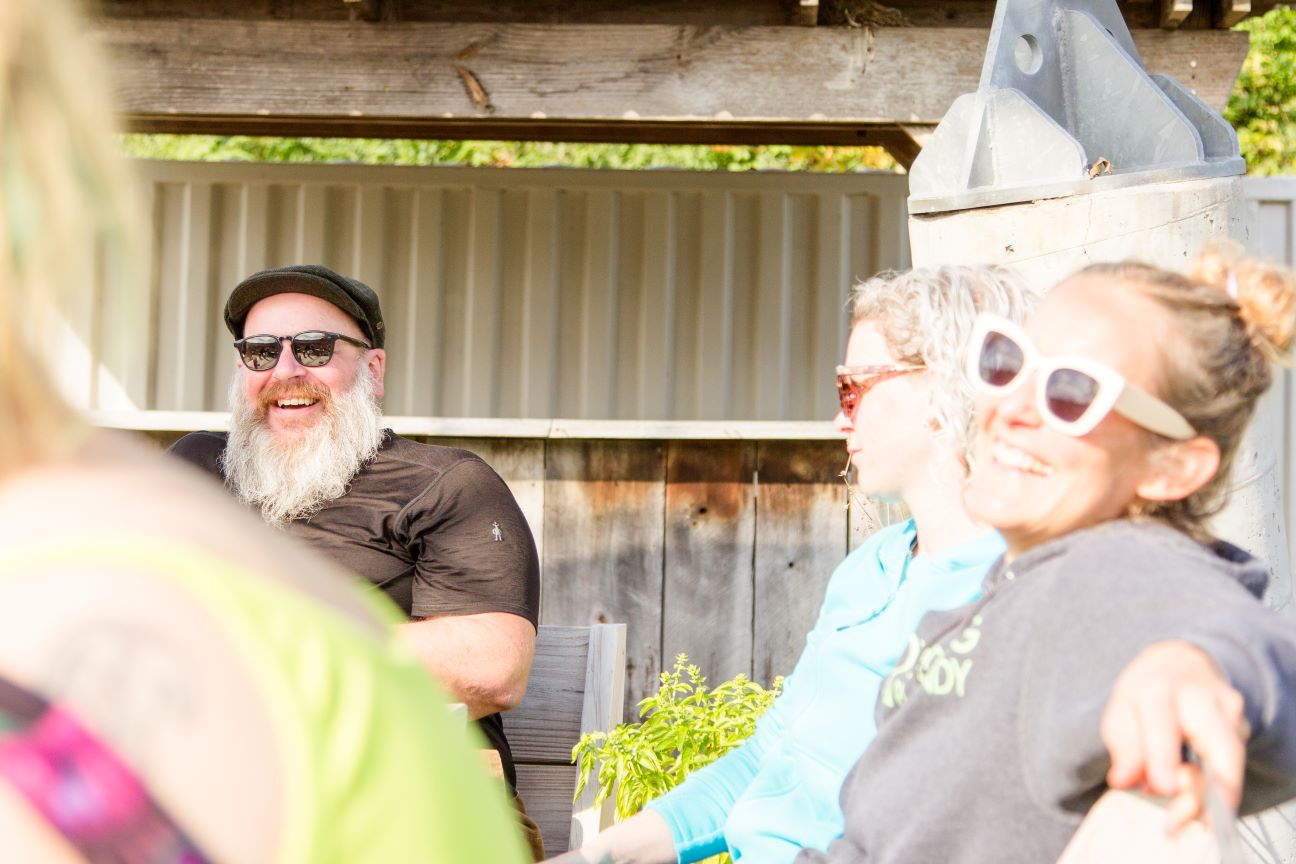Hello Locavores, Progressives, Environmentalists, IWFM-supporters, and Slowfoodites, and Slowfoodettes —
It’s Patch here writing for those of you who weren’t able to make it to the fairgrounds on Sunday.
After everyone stacked their bring-your-own-plates with home-made food, a few local organizational issues were addressed — a little forecasting about some changes which are going to be voted on at the next meeting, like the fact that for a given committee within Slow Food Indy, all chairmembers must also be team-leaders, of which we only keep about 6. It’s been deemed that this needs to change, given that there are far more issues than team-leaders, and, as great as they are, they’ve found they cannot keep up with everything without loosing their dayjobs.
We had a pair of Hendersons get up and tell us about the great fundraising achievements of the year amounting to about $21,000. We were also approached by Jack Johnson, who keeps — as a number of with-it musical artists do today — up on a bit of continual philanthropy for good causes such as what perhaps includes our own.
The past seasons were too a mixed blessing given the news of Kelly Funk, with many of our and others’ fundraising dollars going to assist with keeping things in order during her recovery.
Tyler announced the establishment of an official account set aside for such grievous events befalling our local producers called simply: the Farmer Support Fund: money set aside to help area farmers when in times of dire need.
On this note, Jessica from This Little Farm storage and processing facility got up and explained what had happened. A fire began in the main building and though it was evacuated quickly, the approximately 1-year-old facility was all but lost. Much of the savings of the crew of This Little Farm had gone into construction and equipment for the facility. It was erected as a way to enable small producers to create product without investing undue amounts of time or money in packaging, rendering, or storage. Although they had already begun to see some returns on the investment, the blaze was a spanner in the works. The team had already landed grants to proceed with operations and improve their process. At present, they are still bound by the obligations of the grants, but are suddenly without the capability to fulfill them. Given that so much literally went up in flames, they are looking for help.
More details should be available about this and internal proceedings at the upcoming 7-O’clock assembly on the evening of the 24th at New Day Meadery in Fountain Square, or by e-mailing the any of the Slow Food leadership.
After the team-leader -candidates are announced, we have Slow Food USA’s Josh Viertel to the stage.
He begins with a story about hitchhiking in Sicily. He explains briefly that with the course of his philosophical education, he dealt with a lot of rhetoric about the nature of physical work in one aspect as a means to verify and concrete reality for oneself. He realized that for all his confidence in the words, he did not himself feel confident what physical work meant and was. After speaking with an advisor, and then flagrantly disregarding the advice of said advisor, he put school on hold and left to begin shepherding and farming. It was somewhere in the middle of that that the diminutive Fiat 500 rolled to a stop to pick him up by the shoulder. Josh struck up a conversation with the driver, explaining among other things what had brought him there. It seemed that much of it did not connect, but an aha-moment came when the man seemed to come abreast of what he was saying. He explained back essentially that wisdom comes not strictly from exercising the mind in itself, elucidating properwisdom, knowledge, and understanding come from touching, seeing, and thinking, and that Josh had intuitively detected some imbalance or injustice within himself that he lacked in one department. The driver was himself introspective, feeling he lacked in much the opposite way.
Josh then gives us a piece of his reflection on what perhaps originally leant him to the attraction toward such a position as president of Slow Food. He explained that much of his childhood was spent playing on the kitchen floor, with one of his favourite toys being one of those metal flower-shaped folding vegetable steamers. He speculates he absorbed some his foundations from the time spent on that floor: the ideal that regardless of the circumstances within his family — good times and hard — they would always sit down together for dinner. Food was a medium over which to commune and address problems together. He took with him that people deserve this time spent together, regardless of their economic situation, or walk in life.
He describes next a conversation about hearing the other side. About sitting down and talking with someone who is not family, in fact who considers him to be an antagonist. He is on a plane. He’s sitting next to a man in plain clothes with a hat which gives him away as a fishing enthusiast. Josh, partial to fishing himself, strikes up a conversation with the man, learning that he has a daytime profession as a conventional commodity-crop -grower of corn or soybeans. When it comes time for Josh to explain himself, he does and receives a curt reaction, something like, “Oh, so you’re the people that I hate.” Surprised but persisting, Josh encourages the man (Bill) to explain his position. He felt belittled and devalued by the perception that what he was doing was somehow bad or wrong. He was proud of what he had, proud of doing farmwork. He was afraid it would be taken away from him. Afraid of foreclosure if he could not keep up. Angry with the seed companies, and their growing model. He explained how great that first year had been. How everything had gone like clockwork, how a cropdusting had never delivered such results. But then, the continual need to purchase more seed, and the climbing input-requirements of fertilizer and pesticides. The rising debts. He felt in a way, duped. Slow Food USA was really the very least of his enemies. Josh had just been a vent for frustration, but had listened. He explained that the ideals of the organization were, albeit for different reasons, quite in line with the man’s complaints, and how he felt they should be addressed.
By the end, Josh said, it had not been an entirely comfortable flight, but he was glad to have had the conversation, and at least briefly step out of the bubble of abuzzly contentment that we all know can come so gladly from great potlucks with great food, and good company.
Halfway between New York and Berkley and California, he mentions the importance of his stop here in Indianapolis. One of his fears when he’s lobbying in Washington later this year is that after his initial explanation of what he and his organization are after is that he’ll immediately get the question, “Well, where are your offices?” And if he answers “Ah, well, they’re all in New York.” then he’ll be swiftly written off for being disconnected from where it is all happening, and how it really works.
He urged us as more representative members of the Midwest to continue to speak our message and talk with conventional growers about the state of our food system in the US.
The effort is for a simple purpose; people are connected by having had food together, clearly, and once this bond is established, addressing other problems, such as rebuilding from tragedy is but a small thing. Josh tells us of his vision where all of America comes together one day a week to share a meal. Suddenly, the issues we have all start to seem that much more surmountable.
He finally tells us of a story from one year’s Terra Madre, as he’s stuck as an English-speaking envoy with another party waiting on one more before they can leave on the shuttle. They are only a short leg away from hotels and other services, and Josh has been underway for more than a half day and is ofcourse fancies himself quite tired. Josh keeps being given the bad news of more delays every half-hour, and reluctantly but faithfully keeps up his end, reporting the coming tidings. He talks a bit with the translator for the group to whom he’s passing the messages, and it turns out that their journey had begun with a two-day walk to a bus-station, and had lasted far, far longer than his own. Again a brief aside with the Italian organizer. Another delay. Another. Josh dutifully keeps passing it along, each time with a more grievous apology. The translator to whom he’s passing the messages for the group tells him to stop saying sorry. Once he’s got his attention he explains easily, “Listen. You all have the watches, _we_ have the time.”
After a few questions are fielded, we’re reminded that the upcoming Farm Bill is our most important goal at present. We’re left with one more quote before parting, repeated a few times for emphasis: “You can’t get to Heaven with the contents of your totebag from the farmer’s market,” and paired secondhand from Tyler, “Think not how you spend your time, but how you spend [fusion_builder_container hundred_percent=”yes” overflow=”visible”][fusion_builder_row][fusion_builder_column type=”1_1″ background_position=”left top” background_color=”” border_size=”” border_color=”” border_style=”solid” spacing=”yes” background_image=”” background_repeat=”no-repeat” padding=”” margin_top=”0px” margin_bottom=”0px” class=”” id=”” animation_type=”” animation_speed=”0.3″ animation_direction=”left” hide_on_mobile=”no” center_content=”no” min_height=”none”][and invest] yourself.” We’re then encouraged as members and enthusiasts to become otherwise engaged, and do more for good food, fair food, and sustainability.
[/fusion_builder_column][/fusion_builder_row][/fusion_builder_container]


